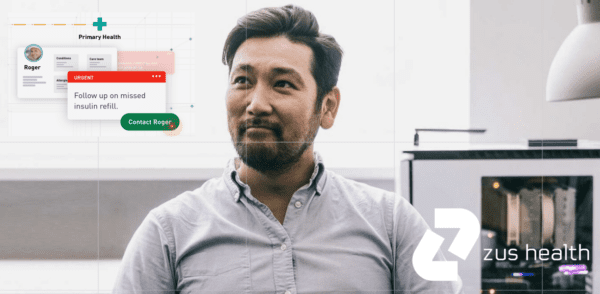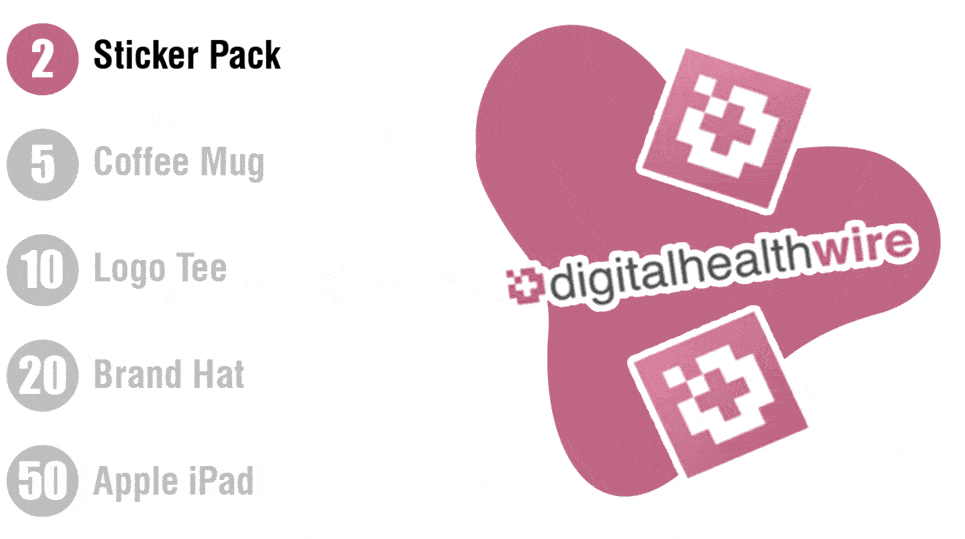|
Zus Funding | PointClickCare + Patient Pattern
March 20, 2023
|
|
|

|
|
Together with
|

|
|
|
“I think the highest and best use of primary care is to earn the right to navigate, earn the right to quarterback care… A quarterback can’t throw the ball and not know where everyone is downfield. You got to see where everybody is… To me, people who can do that best win.”
|
|
Zus Health CEO Jonathan Bush
|
|

|
|
Zus Health is the latest company to set off on a quest for the Holy Grail of healthcare – a universal patient record – and it just landed a $40M venture round to help it in its pursuit.
Founded in 2021 by healthcare veteran Jonathan Bush, Zus originally planned on creating a “Build-a-Bear for EMR, patient relationship management, and CRM” by offering a shared data record and software development kit that other companies could use to build their own tools.
That mission appears to be alive and well, but Zus is also looking to grow into a new role as “the common information ground” that brings comprehensive patient information to the point of care.
The Zus platform centers around the Zus Aggregated Profile (ZAP), a unified view of a patient’s healthcare info aggregated from EHRs, labs, claims networks, and other sources.
- This network provides access to data across 70K+ provider sites and 270M+ patients, which Zus then distills into a user-friendly patient profile through FHIR-normalization, deduplication, and summarization.
- The first time a provider uses Zus to “get up to speed” on a patient, Zus charges $4 to pull the data and plug it into the EHR. Zus then charges a monthly fee for providers to continue receiving updates on that patient.
Zus works with EHR companies that offer the ZAP as an upgrade to their provider customers in exchange for a share in the resulting revenue.
- Alongside the funding news, Zus announced a partnership with Elation Health to bring the ZAP to its EHR that currently supports over 12M patients.
- The Elation announcement follows similar partnerships with Healthie and Canvas, which both saw 95%+ of their providers included in the first rollout upgrade to Zus after a preview of the service.
The Takeaway
More than a few companies have been tempted by the prospect of bringing comprehensive patient information to the point of care, and it hasn’t exactly worked out optimally for any of them. That said, with the 21st Century Cures Act facilitating more health data sharing and a pandemic that’s pulled digital health innovation forward in a drastic way, there’s a case to be made that the timing’s never been better. It’s a long road to get from Build-a-Bear for Healthcare to Universal Patient Record, but the upside is massive if Zus can pull it off.
|




|
|
Creating an Exceptional Engagement Experience
With a surge in experience‑oriented disruptors entering the healthcare industry, patient engagement is becoming a crucial competitive differentiator. Get your copy of Nuance’s guide to delivering intelligent interactions and a better experience at every touchpoint.
|
|
Maximize Provider Administration by Minimizing Manual Tasks
Automated provider credentialing, payor enrollment, and continuous monitoring – all under one roof. Discover how Medallion’s all-in-one platform is helping health systems maximize their provider administration by minimizing manual tasks.
|
|
- PointClickCare Acquires Patient Pattern: Senior-focused care coordination company PointClickCare acquired VBC platform Patient Pattern to help its providers transition to risk-based arrangements through a single solution. Patient Pattern offers an EHR and workflow management platform that serves Medicare Advantage Special Needs Plans, ACO REACH participants, and PACE programs. PointClickCare has been quickly acquiring the missing pieces of its senior care portfolio, picking up QuickMar in 2019 (post-acute care management), Collective Medical in 2020 (care coordination), and Audacious Inquiry in 2022 (health IT).
- Barriers to Mental Health Licensure: A new whitepaper from Motivo Health shared some interesting data on the reasons why 57% of people who earn mental health master’s degrees never attain licensure. Among the top reasons were inadequate pay (29.7%), a complicated licensure process (13.3%), and burnout (11.7%). Master’s of Social Work grads carry an average educational debt of $66k, an average starting salary of $47k, and need multiple years of clinical supervision to attain licensure – hurdles that show how important the post-graduation window is to solving the mental health provider shortage.
- Maribel Health Series A: Home care enabler Maribel Health secured $25M in a Series A round led by General Catalyst after launching as part of the VC firm’s “hatch” program in 2021. Maribel provides clinical workflows, operating capacity, and automation to help health systems implement and scale hospital-at-home programs. It also just lined up its first partners, with Mercy Health System and BAYADA Home Health Care signing on to co-design HAH programs that will serve as the foundation for future Maribel home care models.
- TytoCare FDA 510(k) for Wheeze Detection: TytoCare received FDA 510(k) clearance for its Wheeze Detection algorithm that analyzes sounds gathered from its smart stethoscope to aid in the remote diagnosis of lung conditions. Wheeze Detection will be added to TytoCare’s Home Smart Clinic that debuted last year, an important addition considering that respiratory diagnoses constitute over 40% of diagnoses made using the virtual care solution. Wheeze Detection was previously CE-marked in Europe, and the FDA clearance paves the way for a US launch.
- Upcoding Trends: A Peterson-KFF Health System Tracker study found that Providers are increasingly billing outpatient visits at higher intensity levels, leading to greater OOP costs for many patients. The share of moderate intensity claims (level 3) across physician offices, urgent care centers, and EDs fell from 60% in 2004 to 45% in 2021, while higher intensity claims (level 4) nearly doubled from 19% to 37% even among common diagnoses like UTIs and headaches. Researchers believe the trend is a combination of upcoding, increasing clinical acuity, and changes in services provided.
- DocGo Expansion: DocGo has been going strong, securing over $180M in new contracts since the start of 2023. The telehealth and mobile care company added multiple Philadelphia-based health systems to its customer roster, as well as a “leading hospital network on Long Island” and a primary care network in the UK. The new contracts include population health programs in New York, paramedic-led home visits in the UK, and RPM services Pennsylvania, with all rollouts expected to be completed by the end of Q3.
- OpenLoop Closes $15M: OpenLoop closed $15M in Series A funding to bring white-label telehealth to providers and other digital health startups. OpenLoop handles everything from regulatory and legal assistance to telehealth infrastructure and provider staffing, operating a network of over 6k clinicians across all 50 states. In addition to the capital, OpenLoop announced the launch of a nationwide payor network and revenue cycle management service to enable its clients to grow their patient pools by offering access to more affordable specialty and primary care options.
- Workforce AI Adoption: Staffing constraints are causing more health systems to turn to AI for productivity improvements, according to a hospital exec survey from The Health Management Academy. Nearly 48% of respondents are now using AI for the workforce (85% are planning to increase adoption within three years), with nursing support emerging as a key priority. Although only 15% of health systems are already using AI for nursing, 83% are evaluating nursing AI solutions.
- FIRE1 Adds $25M for HF Monitoring: FIRE1 completed a $25M financing round (total funding now ~$82M) that it will use to continue the development of its heart failure monitoring sensor. The FIRE1 system continuously measures the inferior vena cava for fluid buildup, and alerts clinicians of signs of worsening heart failure. FIRE1 has some healthcare heavyweights in its corner, as its latest round included Medtronic and Novo Holdings (Novo Nordisk and Novozymes controlling shareholder), and Covidien (now part of Medtronic) was among its early investors.
- 2023 Match Breaks Records: The 2023 Match saw a record number of applicants to U.S. residency programs. In all, 42,952 applicants participated, applying for 40,375 certified positions. This growth was partially driven by international medical graduates (+707 applicants), while the number of U.S. medical student seniors declined by 236 applicants.
|
|
unResign From Nursing with connectRN
connectRN’s new campaign unResignation Notice is helping nurses recommit to the profession they love by highlighting both the challenges they face and the reasons why they want to return. “It’s not in a nurse’s nature to quit. Something needs to change, and it’s not the nurses.” Learn more and sign your own unResignation Letter here.
|
|
Clear Arch Health Unlocks Turnkey Virtual Care
Clear Arch Health’s turnkey remote patient monitoring and PERS solutions are fully customizable to meet the unique needs of every organization. Discover how Clear Arch Health is helping hospitals, physicians groups, and home health agencies effectively manage patient care – whenever and wherever it’s needed.
|
|
The New Standard for Prescription Safety
Synapse Medicine’s quick-deploy Prescription Assistance API and components can be up and running in less than a day and instantly connect your HCPs to real-time drug data and prescribing support. Find out how easy it can be to equip your providers with the tools they need to ensure prescription safety and precision for their patients.
|
|
|
Share Digital Health Wire
|
|
Spread the news & help us grow ⚡
|
|
Refer colleagues with your unique link and earn rewards.
|

|
|
|
|
Or copy and share your custom referral link: *|SHAREURL|*
|
|
You currently have *|REFERRALS|* referrals.
|
|
|
|
|